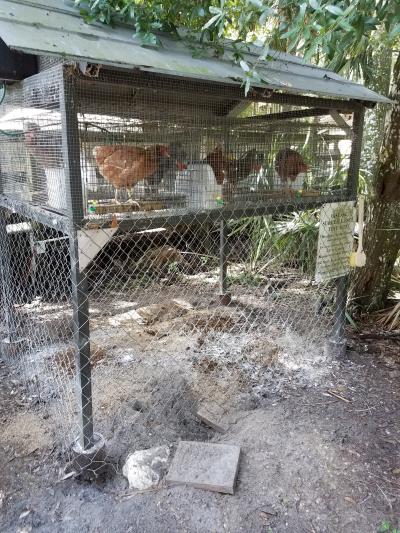
Credit: Photo from Thomas Unnasch, University of South Florida
Your advance look at three new studies in the American Journal of Tropical Medicine and Hygiene.
- `Sentinel Chickens’ Shed Light on US Resurgence of Deadly Mosquito-Borne Virus
- `SuperTowel’ Shows Potential to Limit Spread of Disease in Humanitarian Crises
- Seeking Action to Combat a Major Child Killer: A Global ‘Pandemic’ of Fake Drugs
‘Sentinel Chickens’ Shed Light on US Resurgence of Deadly Mosquito-Borne Virus
Analysis of “sentinel chickens”–flocks deployed specifically to detect the presence of mosquito-borne diseases–reveals the Florida Panhandle as the likely epicenter of a rare but deadly virus that has re-emerged in recent years to spread as far north as Canada, according to a new study published today in the American Journal of Tropical Medicine and Hygiene.
Researchers at Vanderbilt University Medical Center, in collaboration with the Florida Department of Health and the University of South Florida, investigated transmission patterns for Eastern equine encephalitis virus, or EEEV, the deadliest mosquito-borne disease in North America. After decades of sporadic activity, the virus re-emerged about 14 years ago with a spate of cases from Florida to New England and into Nova Scotia, Canada. Infections, which can sicken humans and horses, can progress to a dangerous brain infection. And while that’s rare in humans–only about 70 cases have been reported since 2008–the fact that 30 (43 percent) of victims died has prompted intensive surveillance.
In the current study, researchers analyzed blood samples from thousands of chickens used by state health officials across Florida from 2005 to 2016 to alert them to the presence of EEEV. Chickens can get infected but don’t get sick or transmit the disease. Evidence from the chickens revealed that EEEV is present year-round in the Florida Panhandle and that the region could be “seeding” the virus for the rest of Florida and for Northeastern states as well (EEEV is not found west of the Mississippi River). They believe their findings could lead to disease control efforts in the Panhandle that could reduce risks elsewhere in the United States.
Abstract (embargoed until 5 p.m. ET March 11): http://www.
`SuperTowel’ Shows Potential to Limit Spread of Disease in Humanitarian Crises
A new hand-washing product dubbed the SuperTowelTM could become a useful complementary tool for fighting disease outbreaks in humanitarian crises where limited access to soap and clean water aggravates the spread of conditions like diarrhea and cholera, according to a new study published today in the American Journal of Tropical Medicine and Hygiene.
A team led by researchers from the London School of Hygiene and Tropical Medicine found that various prototypes of the hand-towel-size SuperTowel, made from high-tech microfiber that can neutralize many disease-causing microbes, were more effective than hand-washing with soap at removing bacteria. The product was developed for situations like crowded refugee camps, war-torn cities, and natural disasters where diseases spread by hands that have come into contact with fecal matter are a major humanitarian challenge.
The SuperTowel has to be dipped in a small amount of water to work, but the researchers found it required much less water than normal handwashing. The current study tested the towel in volunteers whose hands had been deliberately exposed to a relatively harmless strain of Escherichia coli (E. Coli) bacteria that, in other forms, can cause severe diarrhea. The researchers said additional studies are needed in more challenging conditions.
Abstract (embargoed until 5 p.m. ET March 11): http://www.
Seeking Action to Combat a Major Child Killer: A Global `Pandemic’ of Fake Drugs
There is urgent need for a new international effort to combat a global surge in poor quality and outright fake medicines that kill more than 250,000 children each year and extract some $200 billion from developing country economies, according to an exhaustive analysis published today in the American Journal of Tropical Medicine and Hygiene.
The assessment from a team of experts from the public and private sector concludes that a “pandemic” of falsified and substandard drugs for treating malaria, pneumonia, hypertension and other diseases has become a public health emergency. It cites evidence that fake malaria drugs alone cause up to 155,000 children to die every year and that a similar number die from low-quality or counterfeit antimicrobial drugs prescribed to treat pneumonia.
The study also notes that fake drugs, often peddled over the Internet and sometimes linked to organized crime and terrorist groups, include medicines for heart disease, erectile dysfunction and cancer, along with fake prescription opioids.
The authors call for more support for a drug surveillance program managed by the World Health Organization and for adding a milestone to the United Nations Sustainable Development Goals in which governments would guarantee that, by 2030, at least 90 percent of medicines sold in their countries are high quality. The authors also seek support for developing affordable tools for testing drug quality at the point of sale, and they recommend a multilateral treaty on “medicine crime” and drug quality.
Abstract (embargoed until 5 p.m. ET March 11): http://www.
###
About the American Society of Tropical Medicine and Hygiene
The American Society of Tropical Medicine and Hygiene, founded in 1903, is the largest international scientific organization of experts dedicated to reducing the worldwide burden of tropical infectious diseases and improving global health. It accomplishes this through generating and sharing scientific evidence, informing health policies and practices, fostering career development, recognizing excellence, and advocating for investment in tropical medicine/global health research. For more information, visit astmh.org.
About the American Journal of Tropical Medicine and Hygiene
Continuously published since 1921, AJTMH is the peer-reviewed journal of the American Society of Tropical Medicine and Hygiene, and the world’s leading voice in the fields of tropical medicine and global health. AJTMH disseminates new knowledge in fundamental, translational, clinical and public health sciences focusing on improving global health.
Contact:
Bridget DeSimone, +1 301.280.5735, [email protected]
Preeti Singh, +1 301.280.5722, [email protected]
Media Contact
Bridget DeSimone
[email protected]




